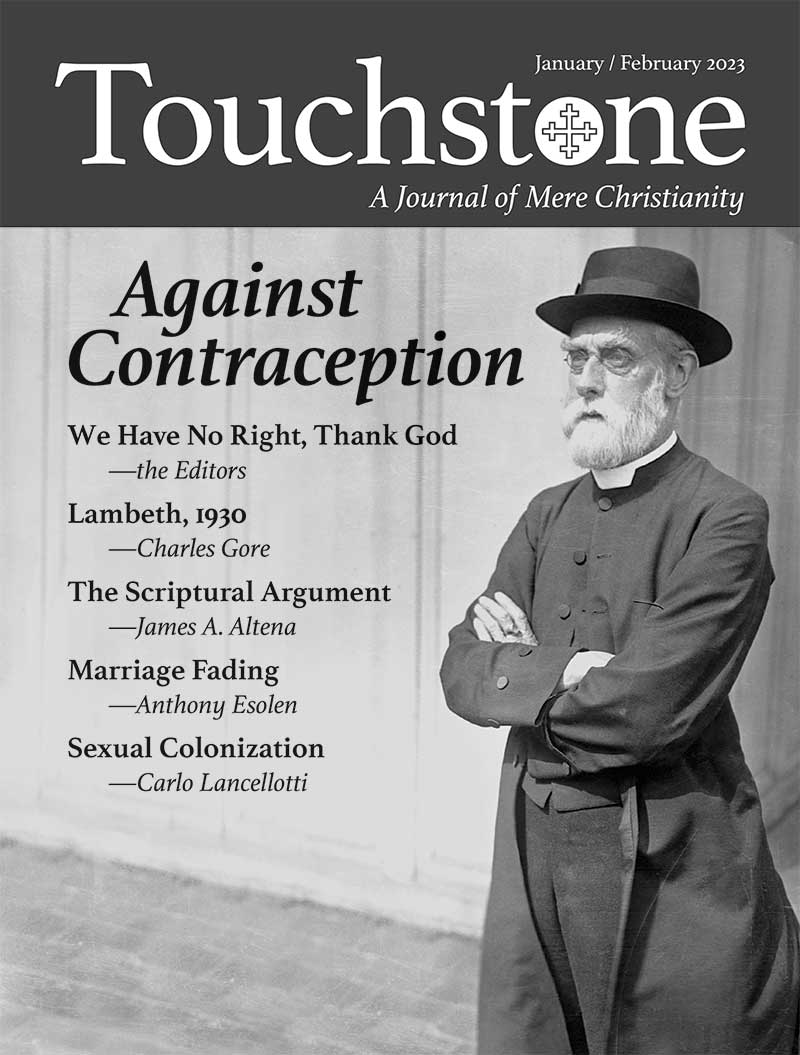Against Contraception
We Have No Right, Thank God
Do not be proud of the fact that your grandmother was shocked at something which you are accustomed to seeing or hearing without being shocked. . . . It may be that your grandmother was an extremely lively and vital animal, and that you are a paralytic. —G.K. Chesterton
Last year, I had the pleasure of sitting beside a young father at a Philadelphia Society dinner in Fort Worth, Texas. The young man knew of our journal, and he asked what unified our editors, despite our denominational differences. He was Roman Catholic and a father of five, so I decided to go in hot. But he did not so much as raise an eyebrow when I told him, “Well, we all oppose contraception and the ordination of women.”
“I never saw the problem with contraception until I got to [Harvard] law school,” he said. Harvard Law School had something to say against contraception? “No, it was when we covered Griswold. We were all amazed to learn that as late as 1965, yesterday really, people thought contraception was bad. Maybe it was accepted by many or even most people by then, I don’t know, but it wasn’t considered a good thing. I just started thinking about it. How could it go from bad to good?”
Good question! How could it? Surely there was some great discovery or something new about the human condition today that we simply didn’t know in 1965—or in 1925, when every Catholic, Protestant, and Eastern Orthodox church in the world regarded contraception as morally illicit (for those who want to understand why the entirety of Christendom was unified against contraception, we point you to James Altena’s feature in this issue).
Maude, 1972
In the 1970s, Norman Lear dominated American television with a string of politically charged sitcoms that promoted progressive thinking, beginning with All in the Family (and with only three channels to choose from in those days, if it was on network television, you probably watched it). In 1972, Lear took a $10,000 payment from Dr. Paul Ehrlich’s Zero Population Growth organization to produce an episode of a sitcom that would promote Ehrlich’s goal of zero population growth.
By 1972, contraception was too passé for Lear and his first All in the Family spinoff, Maude, so he scripted a comedic take on contraception’s first big spinoff sensation and backup plan: legalized abortion. Hi-larious! Cue the laugh track machine! (an invention without which no one today would even know the name Norman Lear). Future contraception spinoffs would include the fatherless home, the collapse of American fertility, the redefinition of marriage, Pornhub, the weaponization of the LGBT movement, and so on, but more on all this later.
In the episode, Maude (played by the 50-year-old Bea Arthur), discovers she is pregnant by her fourth husband. Her daughter Carol implores her to get an abortion, saying, “When you were young, abortion was a dirty word; it’s not anymore. Now you think about that.” Think about what, exactly? Carol didn’t say how abortion could go from bad to good, but she assured her mother that getting an abortion today “was like going to the dentist.” Apparently, it was the ease with which one could commit an evil act that had transformed something bad into something good—that, and the pop-culture imprimatur from the long-since discredited work of Dr. Paul Ehrlich, Norman Lear, and CBS. Three months later, the Supreme Court would issue its Roe v. Wade decision, mandating legalized abortion in every state, and within ten years the number of abortions performed annually in the United States would more than double.
The abortion explosion came as a shock to no one. By the 1970s, our public schools taught every American child that good sex, safe sex = contraception, and that bad sex, dangerous sex = baby. And every junior high school kid understood that this good, safe, righteous sex their teachers were teaching them to practice was not married sex. (Oh, but hey, if you think, um, “fornication”—ha!—makes Jesus sad, then it’s perfectly fine for you to stay home and watch Donny and Marie with your parents, precious.)
So why, in the words of the cool President Obama, should anyone be “punished with a baby” for practicing good, safe, responsible, premarital sex as their teachers instructed? If premarital sex and contraception are morally good, and a baby is bad, then how on earth could abortion be bad? So abortions doubled. What did we think was going to happen?
J. Douglas Johnson is Executive Editor of Touchstone.
bulk subscriptions
Order Touchstone subscriptions in bulk and save $10 per sub! Each subscription includes 6 issues of Touchstone plus full online access to touchstonemag.com—including archives, videos, and pdf downloads of recent issues for only $29.95 each! Great for churches or study groups.
Transactions will be processed on a secure server.
more on family from the online archives

31.5—September/October 2018
Errands into the Moral Wilderness
Forms of Christian Family Witness & Renewal by Allan C. Carlson
more from the online archives
calling all readers
Please Donate
"There are magazines worth reading but few worth saving . . . Touchstone is just such a magazine."
—Alice von Hildebrand
"Here we do not concede one square millimeter of territory to falsehood, folly, contemporary sentimentality, or fashion. We speak the truth, and let God be our judge. . . . Touchstone is the one committedly Christian conservative journal."
—Anthony Esolen, Touchstone senior editor













